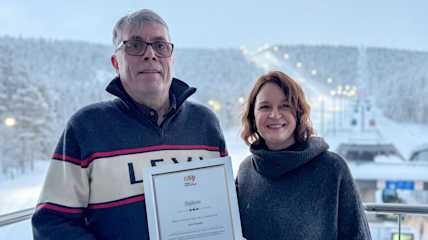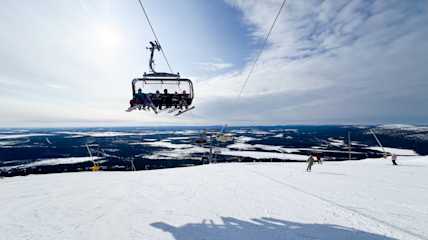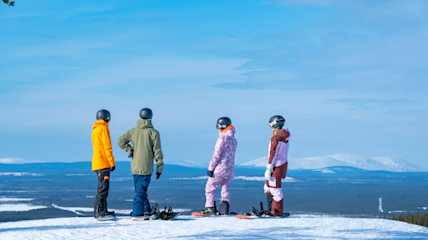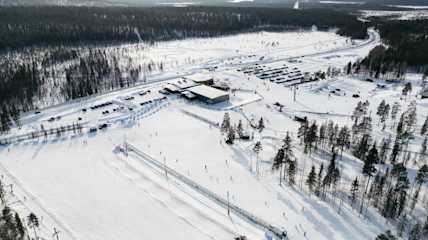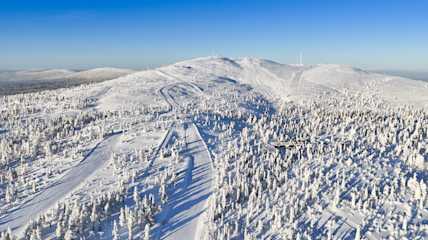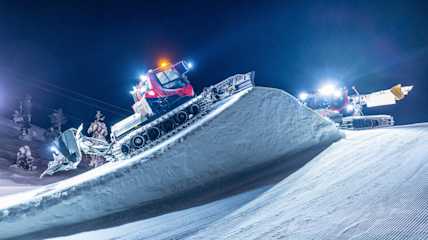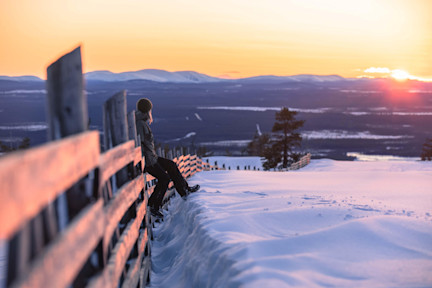
Levi Ski Resort’s Evolving Environmental Program
Levi Ski Resort, Finland’s leading ski destination, is renowned for its long, snow-secure season and commitment to sustainability.
At Levi, nature isn’t just scenery—it’s our home and our livelihood. Every run, every sunrise on the fell, reminds us why we care for this place.
We’ve worked systematically for years and will keep raising the bar. As the first ski resort in the Nordics with ISO 14001 certification and holder of the Sustainable Travel Finland label, we’re proud of the progress—but even more focused on what comes next.
Levi is updating its environmental program for 2025–2030, building on years of systematic work, intelligent snow management— and international best practices.
Solutions Through Collaboration
Levi is actively involved not only in national but also in international cooperation to promote sustainability. In spring 2025, Levi was invited to join the Global Sustainability Ski Alliance (GSSA), a network that brings together major international ski resorts to strengthen the industry’s voice and influence in addressing sustainability challenges. In Finland, the Finnish Ski Area Association, together with the finnish resorts, is strongly driving the industry’s responsibility efforts forward.
White Winters, for it's part, is an international collaborative network for sustainable solutions in the snowsport industry, and Levi Ski Resort is a founding member. Together with AINS Group the White Winters collaboration developed the assessment tool, designed specifically for year-a-round ski resorts operations. This tool helps Levi and other resorts to update the environmental program:
Identify and prioritize key environmental impacts and risks,
Link each impact to concrete, measurable actions,
Track progress with clear indicators (emissions, water use, waste, biodiversity),
Communicate goals and results transparently to all stakeholders.
By participating in the White Winters network and utilizing its jointly developed tools, Levi strengthens its environmental program—making it both ambitious and practical, guided by data, collaboration, and shared sustainability goals.

Genuine Actions in the Ski Resort
Efficient snowmaking and storage snow: Automated systems and the “Levi Glacier” project ensure early snow cover.
LED lighting and automation: Modernized slope lighting and building systems — including building automation and heat recovery from snowmaking — improve efficiency of energy use.
Circular economy practices: Enhanced recycling, waste sorting, and material reuse.
Restoration of developed areas: landscaping during slope area modernization to control erosion.
Reduction in fossil emissions of own operations*
Fossil-free electricity since 2020: impacting close to 50% reduction in ski resort total emissions.
Estimated 84% reduction in fuel-based fossil emissions between 2023-2025: transitioning to geothermal energy in Gondola area buildings in 2024 and transitioning to renewable fuels in groomers for the 2023-2024 season.
* The estimated impact of Levi Ski Resort’s actions is based on emission calculations carried out in 2020 and 2023, using input data from the years 2017–2019 and the financial period 2022–2023. The 2020 calculation was conducted by Afry, and the 2023 calculation was carried out by Nordic Impact.

Levi Ski Resort Environmental Program 2025–2030
The updated environmental program for 2025–2030 is closely tied to Levi Ski Resort’s strategy and values—pioneering, responsibility, and high-quality year-round experiences. The vision: to be Europe’s most advanced year-round ski resort by 2030.
Energy – Energy Efficiency
Goal:
Most energy-efficient ski resort in Europe by 2030
KPIs (Tracked Annually):
• Energy use per skier day ↓
• Snow (m³) per kWh ↑
• Share of renewable energy ↑
Key Actions:
Efficient snow process; digitize & automate snowmaking and grooming; modernize lifts; expand solar & geothermal systems; annual staff training; energy-efficient service buildings
Emissions – Climate Action Plan
Goal:
Reduce emissions from operations and from value chain
KPIs (Tracked Annually):
• CO₂ emissions per skier day ↓
• Share of renewable fuels ↑
• Scope 3 emissions mapping & reduction
Key Actions:
Transition to renewable/electric fleet; supplier collaboration; implement sustainable solutions in service buildings and investment projects; promote sustainable travel choices to reduce overall emissions
Waste & Circularity – Circular Economy
Goal:
Industry leader in circularity by 2030
KPIs (Tracked Annually):
• Recycling rate ↑
• 100% procurement traceability
Key Actions:
Annual fell clean-up event; reuse and repair equipment and materials; apply circular procurement guidelines; monitor material flows
Water – Water & Erosion
Goal:
Optimize water use and minimize erosion
KPIs (Tracked Annually):
• Water use per skier day ↓
• Snowmaking water efficiency ↑
• Storage snow saved (%) ↑
Key Actions:
Improve snow process efficiency; upgrade snowmaking systems; turfing and landscaping; erosion control
Biodiversity – Biodiversity in Ski Resort Operations
Goal:
Integrate a nature footprint model into ski resort operations
KPIs (Tracked Annually):
• Slope turf cover % ↑
• Number of biodiversity pilot projects ↑
• Biodiversity model for ski resorts by 2030
Key Actions:
Restore and landscape areas; remove invasive species; establish research partnerships; explore compensation and protection opportunities
Stakeholder Engagement – Collaboration
Goal:
Strengthen cooperation (Global Sustainability Ski Alliance, White Winters, national level)
KPIs (Tracked Annually):
• Number of joint projects/events ↑
• Participation metrics ↑
Key Actions:
Host sustainability events and workshops; share best practices and innovations
How Progress Will Be Communicated
Levi Ski Resort regularly shares updates on the progress of its environmental program through the following channels:
Levi’s responsibility page
On-site displays for visitors
Annual sustainability reports for partners and stakeholders (VSME – Voluntary Sustainability Reporting Standard framework)
Levi Ski Resort’s updated environmental program is a concrete, measurable, and transparent roadmap to a more sustainable ski resort operations—where snow guarantee meets responsibility.

